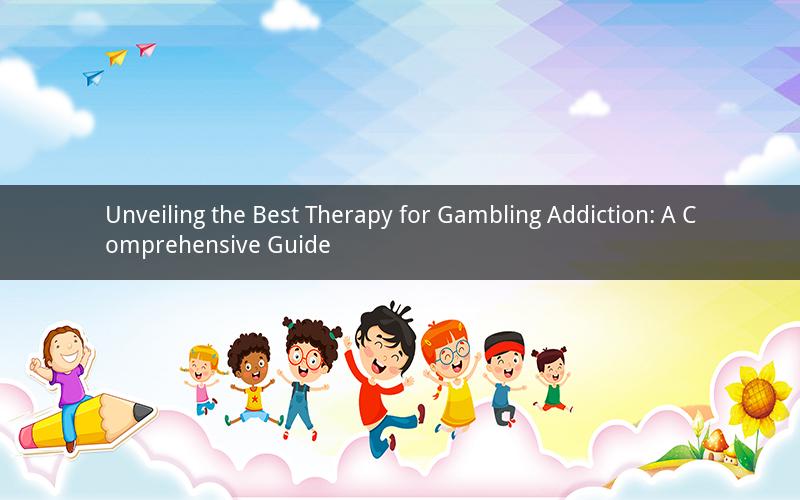
Gambling addiction is a complex issue that affects millions of individuals worldwide. It can lead to significant financial, emotional, and social consequences. The quest for the best therapy for gambling addiction has been ongoing, with various approaches emerging over the years. This article delves into the most effective therapies available, helping individuals find the path to recovery.
1. Cognitive Behavioral Therapy (CBT)
Cognitive Behavioral Therapy (CBT) is widely regarded as the most effective treatment for gambling addiction. It focuses on identifying and changing negative thought patterns and behaviors that contribute to gambling. CBT helps individuals develop healthier coping mechanisms and reduces the urge to gamble.
During CBT sessions, therapists work closely with clients to:
a. Identify and challenge gambling-related beliefs and thoughts
b. Develop strategies to resist gambling triggers
c. Replace gambling-related activities with healthier alternatives
d. Build self-esteem and improve problem-solving skills
1. Motivational Interviewing (MI)
Motivational Interviewing (MI) is another evidence-based therapy that can be effective in treating gambling addiction. It focuses on helping individuals recognize their desire to change and motivating them to take action. MI is particularly useful when individuals are hesitant or resistant to seeking help.
The core principles of MI include:
a. Expressing empathy towards the individual's struggles
b. Developing discrepancy between their current behavior and desired change
c. Enhancing autonomy and self-efficacy
d. Promoting commitment to change
1. Family Therapy
Family therapy plays a crucial role in treating gambling addiction, as it addresses the impact of the addiction on loved ones. It helps family members understand the addiction, develop coping strategies, and improve communication within the family unit.
Family therapy sessions may involve:
a. Educating family members about gambling addiction
b. Identifying and addressing co-dependency issues
c. Promoting healthier communication and conflict resolution skills
d. Strengthening family bonds and support systems
1. 12-Step Programs
12-Step Programs, such as Gamblers Anonymous (GA), provide a supportive community for individuals struggling with gambling addiction. These programs are based on the principles of Alcoholics Anonymous and emphasize personal responsibility, spiritual awakening, and the support of a fellowship.
The key components of 12-Step Programs include:
a. Admitting powerlessness over gambling
b. Seeking a higher power for help
c. Making a moral inventory of one's actions
d. Making amends for harm caused by gambling
1. Medication
In some cases, medication may be used in conjunction with therapy to treat gambling addiction. Antidepressants, mood stabilizers, and naltrexone are among the medications that may be prescribed to help reduce cravings and manage underlying mental health issues.
1. Support Groups
Support groups, such as Gam-Anon, provide a platform for individuals and their loved ones to share experiences, gain insights, and receive support from others facing similar challenges. These groups can be an invaluable resource for ongoing recovery and support.
Support groups offer the following benefits:
a. Sharing experiences and stories
b. Learning from others' coping strategies
c. Building a support network
d. Reaffirming the importance of recovery
1. Conclusion
Treating gambling addiction requires a multi-faceted approach that addresses the individual's unique needs. While no single therapy is universally effective, combining various treatment modalities can increase the chances of successful recovery. It is crucial for individuals seeking help to work closely with healthcare professionals to determine the most suitable treatment plan.
1. Questions and Answers:
Q: What is the primary goal of cognitive behavioral therapy for gambling addiction?
A: The primary goal of cognitive behavioral therapy (CBT) for gambling addiction is to identify and change negative thought patterns and behaviors that contribute to gambling, helping individuals develop healthier coping mechanisms and reduce the urge to gamble.
Q: Can family therapy help individuals struggling with gambling addiction?
A: Yes, family therapy can be highly beneficial in treating gambling addiction. It helps family members understand the addiction, develop coping strategies, and improve communication within the family unit, ultimately strengthening family bonds and support systems.
Q: Are 12-Step Programs effective for treating gambling addiction?
A: Yes, 12-Step Programs like Gamblers Anonymous (GA) can be effective in treating gambling addiction. They provide a supportive community for individuals to share experiences, gain insights, and receive ongoing support, promoting personal responsibility and spiritual awakening.
Q: Can medication be used to treat gambling addiction?
A: Yes, in some cases, medication may be prescribed in conjunction with therapy to treat gambling addiction. Antidepressants, mood stabilizers, and naltrexone are among the medications that may be used to help reduce cravings and manage underlying mental health issues.
Q: Are support groups helpful for individuals struggling with gambling addiction?
A: Yes, support groups such as Gam-Anon can be extremely helpful for individuals struggling with gambling addiction. They offer a platform for sharing experiences, learning from others, building a support network, and reaffirming the importance of recovery.